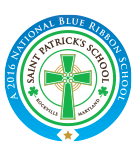Junior High Math at St. Patrick's
Mr. Andrew Ament, grades 7 & 8
Mr. Jake Blauvelt, grade 6
Mrs. Michelle Scango, grade 6-8 (advanced)
Building upon formative skills, junior high math continues to enhance these as well as to develop critical thinking skills that will enable students to interpret and solve both concrete and abstract problems. The junior high curriculums follow those standards as laid out by the Archdiocese of Washington. The goal is to develop student success, confidence and appreciation of mathematic components, applications, and investigations. Math is done both individually and cooperatively in order to foster understanding, support, and diligence. Students in sixth grade will use Course 2, a seventh grade math text, to support the transition to pre-algebra which they will take in seventh grade. The students will then take Algebra I in eighth grade. This sequence is designed to prepare students to take geometry or Algebra II in ninth grade.
Curriculum Highlights:
Continues to develop relationships among symbols, signs, and procedures within expressions, equalities, and inequalities. Computational and conceptual elements are introduced to do pre-algebraic problems to prepare for the seventh grade curriculum. The expectation for Math 6 is that each student will have skill sets solid enough to:
- Compare and order positive and negative integers, decimals, fractions, and mixed numbers within number sense
- Find multiples and factors of numbers
- Compute relationships according to Order of Operations
- Solve problems involving fractions, decimals, ratios, proportions, and percentages
- Translate verbal expressions and sentences to algebraic expression and equations
- Solve linear equations
- Identify, describe, and classify the properties of plane and solid geometric shapes and the relationships between them
- Work in both customary and metric measurements
- Make decisions on how to approach problems and communicate ideas
The expectation for Math 7 is that each student will have skills including, but not limited to:
- Compute sensibly to accuracy, simplify expressions and apply equivalent forms
- Analyze and problem solve life situations through math language to message to comprehension
- Understand and represent basic symbols and notations
- Apply conjectures to consider possible procedures
- Think deductively in both independent and group reasoning
- Review skills in mixed practice exercises
- Recognize pre-algebra concepts in their own lives
- Appreciate geometry and measurements in world forms
The Math 8 expectation is that each student will complete the curriculum with skills including, but not limited to:
- Understand numbers, ways of representing numbers, relationships among numbers, and number systems
- Formulate questions that can be addressed with data and collect, organize, and display relevant data to answer them
- Understand patterns, relations, and functions
- Analyze characteristics and properties of two- and three-dimensional geometric shapes and develop mathematical arguments about geometric relationships
- Understand measurable attributes of objects and units, systems and processes of measurement
- Build new mathematical knowledge through problem solving
- Recognize reasoning and proof as fundamental aspects of mathematics
Expectations of Excellence
Students will strive to:
- Provide quality work, demonstrating both conceptual knowledge and application of concept.
- Work diligently independently as well as in small groups to provide cooperation and confidence in mathematics.
